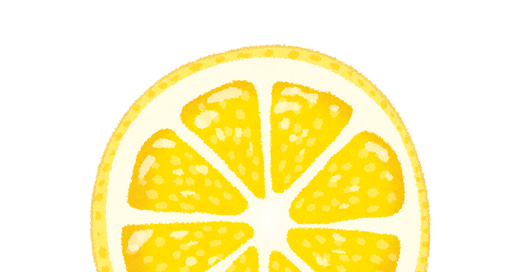This week’s drops:
🍋 Amor Fati: A Latin phrase that asks us to move from knowing to feeling,
🍋 Why choosing the harder path might actually make us happier,
🍋 A metaphor that explains why trauma gets stuck in the body.
💛 1. Amor Fati & the Journey Inward
They say, “The greatest distance we travel is from the brain to the heart.”
This week, I’ve been reflecting on the phrase Amor Fati—“love of fate.” It invites us not just to accept what happens, but to embrace it fully, as if we would chose it.
This kind of radical acceptance isn’t just intellectual. It requires heart. We can understand something logically and still struggle to live it emotionally. That’s the space between insight and embodiment—the long journey from the brain to the heart.
In my work, in parenting, in mindfulness, I see this distance all the time. We know what matters, but we don’t always feel it. We give great advice we struggle to follow.
Bridging this gap can feel challenging. It can come through stillness, self-compassion, and time. Maybe loving our fate begins with softening toward it.
🏔️ 2. Is Efficiency Overrated?
We’re told to work smarter, not harder. But what if effort is part of what gives life meaning?
A 2025 paper in Cognition explored how people often avoid hard work—but also how meaning can arise from effort. The researchers referenced mountaineers who endure brutal conditions for the sake of self-mastery, competence, and autonomy. Their satisfaction comes not in spite of the struggle, but because of it.
In other words, effort begets meaning.
The study suggests that pursuing goals that demand more from us can lead to deeper satisfaction.
So maybe the next time you're tempted to automate, shortcut, or simplify—pause. The harder road might not just be tougher. It might be richer, too.
🪢 3. The Nervous System Knows
A metaphor I heard recently landed with me:
“Every trauma is like a knot in the nervous system.”
It’s such a useful way to understand why trauma lingers. Just like a tight knot in a rope, trauma can constrict the flow of emotion and energy in the body. It traps us in patterns of hyperarousal, anxiety, or numbness—long after the event has passed.
But knots can be untangled.
With gentle attention, with safe spaces, and with time, these patterns can loosen. Somatic practices like breathwork, grounding, and mindful movement aren’t quick fixes—but they help us reconnect to the body and begin to untie what’s been stuck.
With love and gratitude,






Amazing information, love it.🙏🏼🙏🏼
“The body remembers” is a great book that talks about the energetic imprint of trauma. I love the rope metaphor, so visual and easy to see how energy can’t flow!
Thanks Dr Rana 🩷